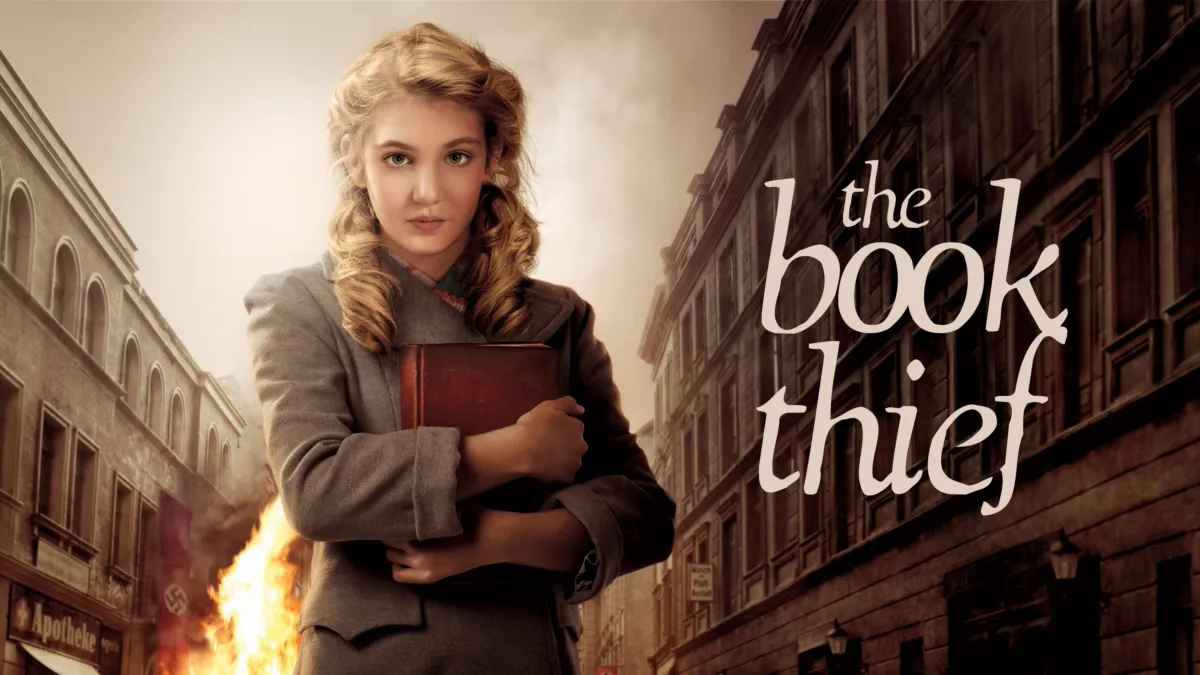The Book Thief (2013)
- fanmovies
- October 8, 2024

Here’s a review of “The Book Thief” (2013):
Plot Summary: “The Book Thief,” directed by Brian Percival and based on the novel by Markus Zusak, is a poignant World War II drama set in Nazi Germany. The film follows a young girl named Liesel Meminger (Sophie Nélisse) who is sent to live with foster parents, Hans (Geoffrey Rush) and Rosa Hubermann (Emily Watson), in the small town of Molching. Struggling with the trauma of losing her brother and the harsh realities of her new life, Liesel finds solace in stealing books and sharing stories. As the war intensifies, she develops a deep friendship with Max Vandenburg (Ben Schnetzer), a Jewish man hiding in her adoptive parents’ basement. Through her love for reading and the power of words, Liesel learns the importance of hope, resilience, and humanity amidst the horrors of war.
Strengths:

- Powerful Performances: The cast delivers exceptional performances, particularly Sophie Nélisse as Liesel. She captures the character’s innocence, curiosity, and growing resilience beautifully. Geoffrey Rush and Emily Watson bring depth to the roles of Hans and Rosa, showcasing the complexities of their personalities and the struggles they face during the war.
- Emotional Depth: The film effectively conveys the emotional weight of its themes—loss, love, and the impact of war on innocent lives. The story is heart-wrenching yet hopeful, reminding viewers of the power of compassion and the human spirit in the face of adversity. Liesel’s relationship with her foster parents and her bond with Max provide emotional anchors that resonate throughout the film.
- Cinematic Beauty: “The Book Thief” is visually stunning, with beautiful cinematography that captures the contrasting beauty of the German landscape against the backdrop of war. The film’s production design immerses viewers in the historical setting, making the world of 1930s and 1940s Germany feel authentic and poignant.
- Narrative Style: The film is narrated by Death (voiced by Roger Allam), adding a unique and philosophical perspective to the story. Death’s reflections on humanity, life, and loss provide depth and introspection, making the narrative more than just a recounting of events but an exploration of the human experience.

Weaknesses:
- Pacing Issues: The film’s pacing can feel uneven at times, particularly in the first half. Some scenes linger longer than necessary, which may detract from the overall flow of the narrative. This can lead to moments where the story feels slow, potentially losing the attention of some viewers.
- Simplified Plot Elements: While the film addresses profound themes, certain plot elements may feel somewhat simplified or less developed, particularly in the exploration of the broader historical context. Some characters and events may not receive the depth needed to fully understand their motivations and implications in the war-torn setting.
- Limited Character Development: While the main characters are well-developed, some supporting characters lack depth. Certain individuals who play key roles in Liesel’s life, such as her schoolmates or other townspeople, are not explored in detail, making them feel more like archetypes than fully realized characters.

Overall Impression: “The Book Thief” is a beautifully crafted film that tells a powerful story of love, loss, and the transformative power of words. With strong performances, emotional depth, and stunning visuals, it effectively captures the human experience during one of history’s darkest times. Despite some pacing issues and a few simplified plot elements, the film’s heartwarming message and Liesel’s journey resonate with audiences, making it a poignant watch for anyone interested in stories of resilience and the impact of literature.
For viewers who appreciate historical dramas with a focus on personal stories amid larger events, “The Book Thief” is a touching and thought-provoking film that leaves a lasting impression.











